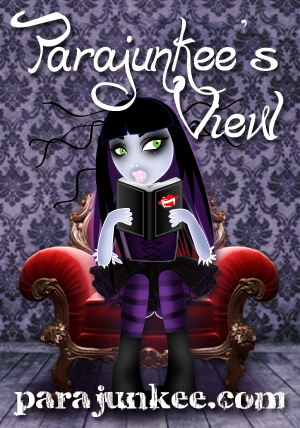I’ve had an interesting relationship with agents. At 24, I had the charmed traditional
writing career that most writers dream about—eight books, a world-famous agent representing
them, and my foot in the doorway of major publishing companies around the world. Then, at 28,
I decided to ditch all that and fly solo for awhile, just to see if it could be done.
You see, most new authors consider ‘getting an agent’ as the Holy Grail of the writing
world, the magical key that will unlock their careers. And, in a way, they’re right. An agent
can get your work into places that cold-submissions can’t. Having an agent also gives a writer a certain respectability, something that is extremely important in a system that is being inundated with lots and lots of crap. (Having been a slush editor for awhile, believe me when I tell you that most of it is total crap.) The availability of Microsoft Word to every Common Joe has suddenly increased the amount of submissions to unmanageable proportions. Imagine having to read through a hundred—a hundred!—story pitches a day. And that’s not even considering the sample chapters that may or may not have been requested. Can we say brain-fry?
For this reason, a lot of big publishing houses have just stopped taking unagented
submissions. Anybody and his mother can slap a few words on a document right now, attach it
to an email, and hit SEND. The fact that it’s so easy to submit stories has made it harder on the
rest of us, who are going to be contending with the half-interested shmucks who are submitting
out of a curiosity to see ‘if they’re any good’ rather than a gut-deep desire to make a living out
of it. (Yes, I had a lot of people with that half-interested attitude submit their stories, and they
were basically using the magazine’s submission system [and my personal time!] as an egotistical gauge just to see if they could naturally write something that it took other people decades to learn to write well. Almost inevitably, those submissions were crap. Total crap.)
The fact that it is now so extremely difficult and time-consuming for editors to pull
the diamonds from the rough is also why so many editors have started to let the agents be the
gatekeepers to the publishing world. Basically, they’re using the agents as a barrier to save
themselves time. (Lots and lots and lots of time.) They’re letting the agents do the digging, then
they can pick and choose from the diamonds that the agents have already spent thousands of
hours poring through tens of thousands of query letters to find.
This is why it’s so extremely important for authors to establish themselves as
professionals in their cover letters, any cover letters. In today’s world, editors are simply
swamped with writers. They get mobbed at writing conferences and accosted on the streets.
They’re stuck in the uncomfortable position of being worshipped by thousands of starry-eyed
(yet also usually extremely bad) writers who are frustrated with the gateway system and feel like
they would be recognized if they could just get to the right people.
Well, they’re partially right. Authors do need to get to the right people. But they also
need to make their work good. Catchy. Within the first few lines, they’ve gotta wow and amaze,
because gee, there’s another 99 letters on the stack today, and lunch is in twenty minutes.
So rewind to me, a starry-eyed, naïve Alaskan of 24 years, landing one of the top agents
in New York City. ‘Thrilled’ didn’t even begin to describe my glee. I was sure that, with my
agent at my back, doors would open for me. And they did, in a way. There was an immediate
change in my responses to short-story queries. (It’s not really financially viable to get an
agent—who usually takes about 10-15% for their services—to submit short stories in today’s
day and age, where a short-storyist is lucky to make 5 cents a work, with 4,000 words being the generally accepted sweet spot.) The number of personal responses as opposed to form letters increased by about two-thirds. Because, honestly, editors take writers more seriously if they've already made it through the gate.
But aside from the related increase in short-story sales, having an agent didn’t do much
for me. After the first year went by without any interest from editors from the book my agent
was representing, I wanted to get things moving faster. I asked him to look at another book, to
start the process of getting another manuscript out to editors. His glacially slow and painfully
lackluster responses led to the first crack in my starry-eyed naivete concerning agents in general. Because, damn it, I had the best of the best. And not only was he still taking six months to respond to an email, but I was being told that submitting multiple novels at once was a taboo amongst the publishing industry, one that would basically get me blacklisted.
…excuse me?
But I held on. Because, damn it, you had to have an agent to succeed. …didn’t you? At
a little over the two-year mark, with still only one novel having been submitted to NY publishers
and no real hope to get another novel out there anytime soon, I took a step back and evaluated the situation. Consider this: I write fast. I can put out 6-8 novels a year, if I’m not distracted. But I was being told that my next novel was not going to be able to be submitted until all of the editors had seen my first novel. Thus, still convinced that I needed an agent to succeed, I issued an ultimatum (something you’re not supposed to do, but I’m confident in my abilities as a Very Good Writer, and I knew I could get another agent if I wanted one): Start submitting other novels, or I will have to find another agent.
Instead of taking months, my response was immediate, within the next day. The gist was
this: I’m sorry I’m a world-famous agent, my time is extremely limited, and new authors are
(unfortunately) at the bottom of my priority list. I would be happy to give you over to one of the
new agents in my company, as she’s hungry for new clients and has plenty of time to work with
you, if things are not going fast enough for you.
Well, they weren’t going fast enough for me. Though I was leery of stepping away from
the Big Name, I would still be represented by his company, and therefore I figured I’d take
the chance. Enter two more years of frustrating back-and-forth in which my new agent—who
thankfully got right to work reading my stories, something that the old agent had not been able to find the time to do—loved the stories and spent all night reading them (this coming from a jaded literary agent who dug through slush for a living), but had plenty of ideas on what to change in the novels and still did not actively start submitting anything new. After four years. One novel.
So, after getting picked up at the outrageously young age of 24, I still hadn’t 1) sold a
novel or 2) hadn’t had more than one of my 8 manuscripts submitted to publishers in four years
of waiting. With the last of my idealism finally shattered with 4 years of disappointment, I did
the unthinkable. I left that ‘perfect’ relationship and, despite multiple offers of representation,
turned to epublishing. Because seriously, folks. Even a brain-dead zombie on crack can see that epublishing is the wave of the future. Further, Amazon and its kindred do something glorious: They completely remove the middle-men. All of them. No loops upon gates upon hoops to jump through to get your novels to the masses. It’s just you and your readers. And that is really cool.
What I’m gambling on—and it’s a big gamble—is that my novels are good enough that
they will give novels from the big publishing houses a run for their money. If they’re not, well, I
can basically kiss my chances of those books ever being published in traditional media goodbye, because no traditional publisher wants to take on a ‘failed’ novel. Publishing is a business, and if your numbers don’t meet their standards, then it’s probably not something you want to mention in your next cover letter. 50,000 books sold is basically the sweet spot. If you don’t sell that many, a self-pubbed book is going to be a black mark on your record, so keep it under wraps.
On the other hand, I do write fast. While a lot of authors would utterly balk at what
I’m doing, since most only see themselves capable of writing 2-3 novels in their lifetimes, I’m
perfectly willing to sacrifice a few novels at the altar of Amazon to see what happens. And, so
far, I have been very pleased with the results. I've gotten my books to thousands of readers in
the span of a couple months. My madman’s gamble, it seems, is totally paying off…
Today my book, Alaskan Fire, is on Amazon for FREE.
So make sure to pick up your copy here:
http://www.amazon.com/Alaskan-Guardians-First-Realm-ebook/dp/B0073WZ01C/
and after you read that pick up your copy of the Second book in the series, Alaskan Fury. http://www.amazon.com/Alaskan-Guardians-First-Realm-ebook/dp/B0073WZ01C/
Available on April 20th, Millennium Potion: Wings of Retribution.
You can visit the Author at the links below:
- Website: http://www.kingfiction.com/
- Facebook: http://www.facebook.com/kingfiction,
- Goodreads: http://www.goodreads.com/author/show/5804792.Sara_King
- Email: kingnovel@gmail.com


















2 comments:
Very interesting and insightful. Thanks for sharing your experience. Keep up the great work. I LOVE your books and may never have found them had you not been brave and/or crazy enough to go out on your own.
فرسان النيل هى الاولى فى نقل العفش بالدمام هي شركة نقل عفش بالخبر وشركة نقل عفش بالجبيل والدمام وشركة نقل عفش بالقطيف والدمام وشركة نقل عفش بالاحساء وشركة نقل عفش بقيق وراس التنورة
شركة نقل عفش بالدمام
شركة نقل اثاث بالدمام
Post a Comment